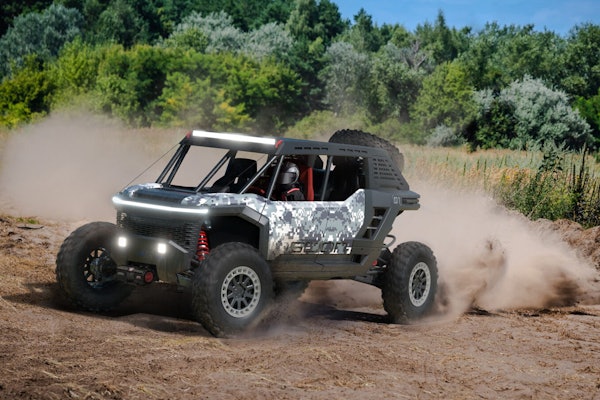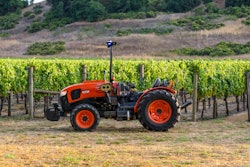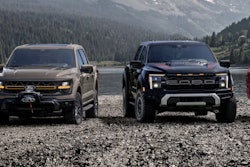Rising fuel prices and increasingly stringent EPA regulations have made fuel efficiency a top priority for landscapers. As new engine and powertrain offerings appear, however, choosing even a basic machine like a mower can turn into a daunting task as each fuel type has advantages and disadvantages that savvy landscapers must consider before they make a purchase decision.
Propane power comes of age
One of the newest fuels to hit the mower market is propane. Dixie Chopper is leading the propane charge, because the company feels propane is an efficient and environmentally friendly fuel. In fact, Dixie Chopper’s LP3000, a new zero-turn mower, has been designed specifically for use with propane, or liquefied petroleum gas. Randy Prigge, Dixie Chopper’s national sales manager, says response to propane as a mower fuel by landscapers has been cautious. Still, school systems and municipalities are in the bid cycle to purchase the mower, and a number of cities involved in the Clean Cities Program have tested it as well because it is such a clean-burning fuel.
Prigge says Dixie Chopper began developing the new mower about three years ago in response to customers in California, Texas and the western part of the U.S. who wanted cleaner-burning fuel. “There was not a market at that point,” Prigge says. “But we felt the potential for one was there.”
Unlike gas or diesel, propane must be purchased in special, pressurized tanks. It is flammable, but according to Allen Gilbert, Dixie Chopper’s alternative fuel project specialist, propane is generally safe to handle. “Propane is the same fuel that millions of people use to cook burgers every weekend,” he notes. The difference is that propane-fueled grills require an open flame, while the propane mower is contained in a sealed, internal-combustion system.
Dixie Chopper has teamed with Ferrellgas, the second-largest supplier of propane in the U.S., to offer free safety training to customers. “It’s easy to handle,” says Eric Bates, senior national sales manager for Ferrellgas. “We just want to make sure everyone knows how to do so safely.”
Prigge says approximately 17,000 gallons of gasoline are spilled each year in refueling lawn and garden equipment. The propane tanks, however, are impermeable, so leakage is not a problem. “Evaporation emissions are nonexistent on this machine,” Gilbert says. Propane also does not emit as many hydrocarbons as gasoline and diesel. “Your engine life is extended considerably by propane (when compared with gasoline),” he says. “Propane doesn’t dilute the oil of the engine because fewer hydrocarbons enter the crankcase oil, so you getter better engine lubrication over the life of the machine.”
Another appealing aspect for landscapers in cities with smog issues is that propane mowers can run on ozone-alert days because of their low emissions levels while gasoline mowers cannot.
In addition to environmental issues, the propane mower is simply more cost-effective, according to Dixie Chopper. Prigge says 95 percent of propane is produced in the U.S., and the 5 percent of foreign-produced propane adds to supplies mainly in the winter when demand is highest for heating. Propane reaches its lowest commodity price during the summer months, when lawnmower use increases. “The curve is just perfect for the landscaping industry,” Prigge says.
Propane mowers are also cheaper to buy than diesel mowers. Prigge says consumers can expect to pay about $2,000 more for a diesel mower with the same cutting width as a lower-priced gas or propane mower. Diesel fuel has also become more expensive, Gilbert says. “When you consider the difference in the cost of fuel, propane is much more efficient to run.”
Does the infrastructure exist to support propane-powered mowers?
Though supporters of propane say the special sealed containers prevent spillage and reduce evaporation emissions, others see them as a drawback. “It’s not the most convenient fuel to use, regardless of size and scale,” says Andy Traxel, engineering manager for Briggs and Stratton Commercial Power. Traxel says in any given community, only a handful of people sell propane. “What do you do if you run out of fuel? he says. “How much should you take with you that day?”
Propane suppliers exist, though they may not be as visible as gas stations. “It’s not like we’re putting something out there that doesn’t have support infrastructure,” Prigge counters.
Bates says Ferrellgas has delivery services in almost every city nationwide. “It’s probably actually easier for landscapers than getting gas or diesel, because propane suppliers are used to delivering fuel to their customers,” he notes. “For us, it seems like it’s convenient, but we understand that customers who’ve never used propane before are going to have questions about its availability and use.”
Briggs and Stratton offers an engine that has been converted to use with propane fuel, but Traxel says he hasn’t seen a rush for propane use by landscapers who need to be on the move throughout the day. And propane is still a fossil fuel, he adds. “As we move forward, we’re going to have to look at alternatives to petroleum-based fuels.”
Long life with diesel
Diesel engines have made big inroads into the commercial mower market in recent years thanks to their inherent fuel economy advantages over gasoline-powered engines, Traxel says. “Diesel engines are mechanically stronger because of the nature of the diesel combustion process,” he explains. “With a diesel engine, users get significantly more power for the equivalent amount of fuel used compared with gas-powered engines. Diesel engines cost more initially, but they offer durability, reliability and long engine life.”
Mike Reinhart, marketing manager, industrial engines, Caterpillar, says Cat promotes diesel engines for mowers because of this inherent durability. Modern diesel engines make less noise, he notes, and have better fuel economy and offer more low-end torque than gasoline engines.
“Basically, it’s about productivity,” Reinhart says. “If you’re mowing in very heavy or high grass, you’re able to maintain high, optimal speed with your piece of equipment. There is enough low-end torque to be able to do the job without slowing down.” In contrast, Reinhart says, gasoline-fueled engines produce less torque at higher RPMs.
Diesel engines have outstanding fuel economy characteristics, which add to their increased productivity in the field because users don’t have to stop to refuel as often as they do with gasoline units. Diesel engines also have 500-hour oil change intervals, Reinhart says, so they require maintenance less frequently. The diesel engine is also designed to equal or exceed the life of the equipment, while a gasoline engine might have to be replaced at some point, Reinhart says.
Like propane engines, diesels can run on ozone-awareness days because they meet emissions requirements, Reinhart says.
Gasoline: Still the most popular choice
With gas-fueled mowers, “widespread availability is probably your number one benefit,” says Matt Gersib, public relations counsel for Briggs and Stratton Commercial Power. “And that leads to a wider array of products to choose from. You can get the engines in just about any horsepower range or configuration imaginable.”
Gas-fueled engines are easy to produce and package, which makes them cheaper to produce and purchase. Diesel engines’ basic design requires they withstand significantly higher combustion pressure internally than gas engines do. But that means diesel engines have to be over-designed and over-engineered to withstand those higher internal forces. As a result, diesel engines tend to be much heavier than gas-fueled ones, and more expensive to purchase, Gersib says. In addition, this extra weight makes a performance difference in smaller diesel engines with lower horsepower outputs.
Another appealing aspect concerning gas engines is the wider range of options they’re offered with. “These options result in more price options,” Traxel notes. “Features like liquid- or air-cooled engines, amount of horsepower, engine weight – all those things mix together to give a higher number of mower packing and price points that can appeal to both entry-level and established landscapers.”
And the evolution of gasoline-powered engines is ongoing. Beginning this month, Briggs & Stratton will offer a new option on gas-fueled engines with at least 20 horsepower – a three-cylinder, liquid-cooled engine with electronic fuel injection (EFI). Though engines with EFI will cost more to buy initially, Gersib says landscapers can expect to save up to 25 percent in fuel costs because of the engine’s improved fuel economy.
“With EFI, you’ve got a computerized system that has the ability to adapt,” Gersib says. “When the blade meets the grass, you’re going to get quicker starting, and you’re not going to be burning nearly as much fuel.”
Whether to buy gas- and diesel-fueled lawnmowers depends largely on the landscaper and the equipment he already has. If the mower will be the landscaper’s biggest piece of equipment, he may choose a gas mower because all of his other equipment is gas-powered so that he only has to carry one type of fuel to jobsites. Along the same lines, if the mower is a relatively small piece of equipment for the purchaser, he will probably want a diesel-powered machine.
Talk to Us
Which fuel option do you use most? Let us know. Contact Christina Jesson, managing editor, at 205-248-1015 or e-mail [email protected].





